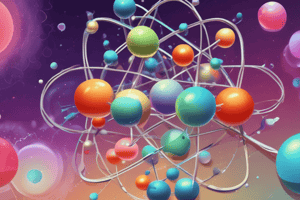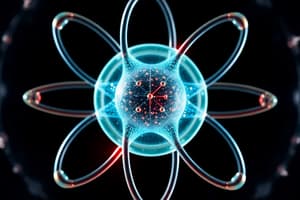Podcast
Questions and Answers
If a solid contains some particles that melt at 50°C and other particles that melt at 110°C, what must be true about the solid?
If a solid contains some particles that melt at 50°C and other particles that melt at 110°C, what must be true about the solid?
The solid is a mixture.
Which of the following definitions characterizes an element?
Which of the following definitions characterizes an element?
- Contains only one type of atom (correct)
- Contains multiple types of atoms
- Can be broken down into simpler substances
- Is always a solid
Which of the following is true about pure substances?
Which of the following is true about pure substances?
- They have varying chemical properties
- Have the same chemical properties throughout (correct)
- Contain multiple elements
- They can be mixtures
A liquid boils at 120°C until it all evaporates, leaving an empty container. What is most likely true about the liquid?
A liquid boils at 120°C until it all evaporates, leaving an empty container. What is most likely true about the liquid?
What defines a mixture?
What defines a mixture?
Jayla has two wires that are both made of pure copper. One of the wires is bigger than the other wire. Which of the following is true about the particles of the wires?
Jayla has two wires that are both made of pure copper. One of the wires is bigger than the other wire. Which of the following is true about the particles of the wires?
How many elements are found in the following chemical equation?
How many elements are found in the following chemical equation?
One of the element carbon combines with one of the element oxygen to form one of the compound carbon dioxide.
One of the element carbon combines with one of the element oxygen to form one of the compound carbon dioxide.
Which of the following is true about a compound and its elements?
Which of the following is true about a compound and its elements?
Vince is baking a cake. He pours flour and sugar into an empty bowl. The substance in the bowl is a(n) __________.
Vince is baking a cake. He pours flour and sugar into an empty bowl. The substance in the bowl is a(n) __________.
What is the smallest particle of an element?
What is the smallest particle of an element?
Which is a substance made up of only one kind of atom?
Which is a substance made up of only one kind of atom?
Sharon pours salt into a glass of water. The salt dissolves. The substance in the glass is a(n) __________.
Sharon pours salt into a glass of water. The salt dissolves. The substance in the glass is a(n) __________.
The chemical formula of a particular substance is NO2. Which of the following is a correct description of the substance?
The chemical formula of a particular substance is NO2. Which of the following is a correct description of the substance?
Which of the following molecular models represents an element?
Which of the following molecular models represents an element?
Marcus has a piece of metal. He knows that the metal is either made of pure zinc or a mixture of zinc and iron. What property could he easily measure in the lab to help him determine whether the metal is pure zinc?
Marcus has a piece of metal. He knows that the metal is either made of pure zinc or a mixture of zinc and iron. What property could he easily measure in the lab to help him determine whether the metal is pure zinc?
The air we breathe contains different individual gases (mostly nitrogen and oxygen). Which of the following correctly describes the air we breathe?
The air we breathe contains different individual gases (mostly nitrogen and oxygen). Which of the following correctly describes the air we breathe?
Lemonade is best described as _______.
Lemonade is best described as _______.
Harley mixes a cup of sugar and a cup of salt together inside a large bowl. The sugar and salt form a mixture and do not chemically combine. Which of the following conclusions can be made about these particles?
Harley mixes a cup of sugar and a cup of salt together inside a large bowl. The sugar and salt form a mixture and do not chemically combine. Which of the following conclusions can be made about these particles?
Flashcards are hidden until you start studying
Study Notes
Mixtures and Pure Substances
- A solid that melts at different temperatures (e.g., 50°C and 110°C) is classified as a mixture.
- A mixture can be separated into its basic substances using physical methods.
- When flour and sugar are combined in a bowl, they form a mixture rather than a chemical compound.
- Salt dissolved in water creates a mixture, demonstrating that substances can retain their properties when mixed without chemical reactions.
Elements and Compounds
- An element consists of only one type of atom.
- Pure substances display consistent chemical properties throughout.
- The properties of a compound differ from those of its constituent elements; for example, carbon dioxide has characteristics distinct from those of carbon and oxygen.
- The smallest unit of an element is called an atom, while the smallest unit of a compound is a molecule.
- The chemical formula NO2 indicates a compound consisting of one nitrogen atom and two oxygen atoms.
Other Relevant Concepts
- The air we breathe, primarily composed of nitrogen and oxygen, is categorized as a mixture due to the presence of various individual gases.
- Density is a measurable property that can help identify if a metal (like zinc) is pure or a mixture.
- In molecular models, elements can be distinguished, such as a yellow model representing a specific element.
Key Facts
- A pure substance remains consistent in chemical properties, unlike mixtures.
- Compound formation involves combining elements, leading to a new substance with unique properties.
- Everyday examples, such as lemonade, exemplify mixtures as they combine multiple ingredients without forming a new chemical entity.
Studying That Suits You
Use AI to generate personalized quizzes and flashcards to suit your learning preferences.




